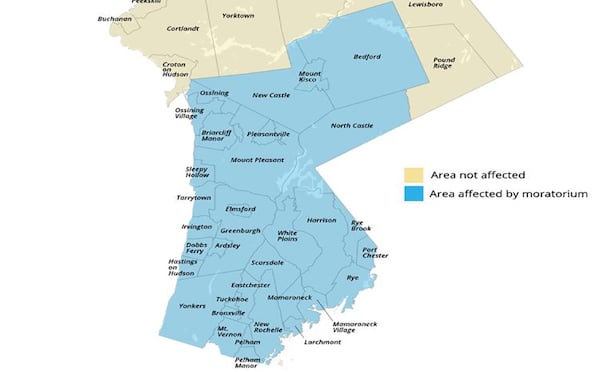 The natural gas connection moratorium will begin on March 15.
The natural gas connection moratorium will begin on March 15.
WHITE PLAINS—Westchester County Executive George Latimer, along with a number of state and local officials, were scheduled to meet with Con Ed officials sometime today to discuss the impending new natural gas connection moratorium set to begin on March 15 that could adversely impact a host of major projects on the drawing boards in the county.
The meeting with the County Executive was not open to the public or the press but was geared as a fact-finding session by County Executive Latimer to ascertain from the utility the reasons behind the imposition of the moratorium on new natural gas connections that is scheduled to begin on March 15 for all of southern and central Westchester County.
Meanwhile, the state Public Service Commission has scheduled public hearings beginning the week of Feb. 11 on the new natural gas connection ban in Westchester County. Specific dates and locations for the sessions has yet to be released by the PSC.
The Business Council of Westchester has stated that it plans to form a task force to deal with the Con Ed moratorium and its impact on the Westchester County economy. Details on the task force's membership and when it plans to hold its first meeting were unavailable at press time.
The impending moratorium was announced by Con Edison on Friday, Jan. 18 and will impact the county's major urban centers including—Yonkers, New Rochelle, White Plains and Mount Vernon. Sections of Northern Westchester are not included in the moratorium and therefore planned development projects in Peekskill, for example, are not impacted as yet.
PSC chair John B. Rhodes said in a prepared statement, “The recent decision by Con Edison to stop accepting new customers raises a number of concerns that the commission is committed to taking quick and diligent steps to address. As a first step, Department of Public Service staff will lead a comprehensive analysis and develop a report to review the changing market conditions that gave rise to Con Edison's decision and to develop recommendations to make certain that utilities across the state are able to meet customer needs in a manner consistent with the state's energy goals.”
He added that as part of the analysis DPS staff will focus on Westchester County and other areas of the state that may have issues related to natural gas supply and demand. Con Edison officials have stated that it is possible the moratorium could be expanded to other New York metro markets in the future
The DPS staff will analyze short-term and long-term market conditions, along with the capacity of natural gas infrastructure and alternatives, and their role in aiding the transition to a clean energy economy, Rhodes said.
The report will consider all options available to utilities to respond to changing market conditions. The report and recommendations will be submitted by July 1 to the Public Service Commission and State Energy Planning Board for their review.
Con Edison has blamed the heightened demand on new business and construction projects for imposing the moratorium.
“The demand for natural gas in our service area has been experiencing significant growth primarily due to the construction of new buildings, the opening of new businesses, and conversions from oil to cleaner-burning natural gas in existing buildings,” Con Edison stated, “But all of this new demand for gas is reaching the limits of the current supplies to our service area.”
The utility further stated, “As a result, and to maintain reliable service to our existing natural gas customers on the coldest days, we will no longer be accepting applications for natural gas connections from new customers in most of our Westchester County service area beginning March 15, 2019. There are some areas in the northernmost sections of the county where we have more capacity and may still be able to accept new customers. Existing customers are not affected by the moratorium.”
© Touchpoint Markets, All Rights Reserved. Request academic re-use from www.copyright.com. All other uses, submit a request to [email protected]. For more inforrmation visit Asset & Logo Licensing.







